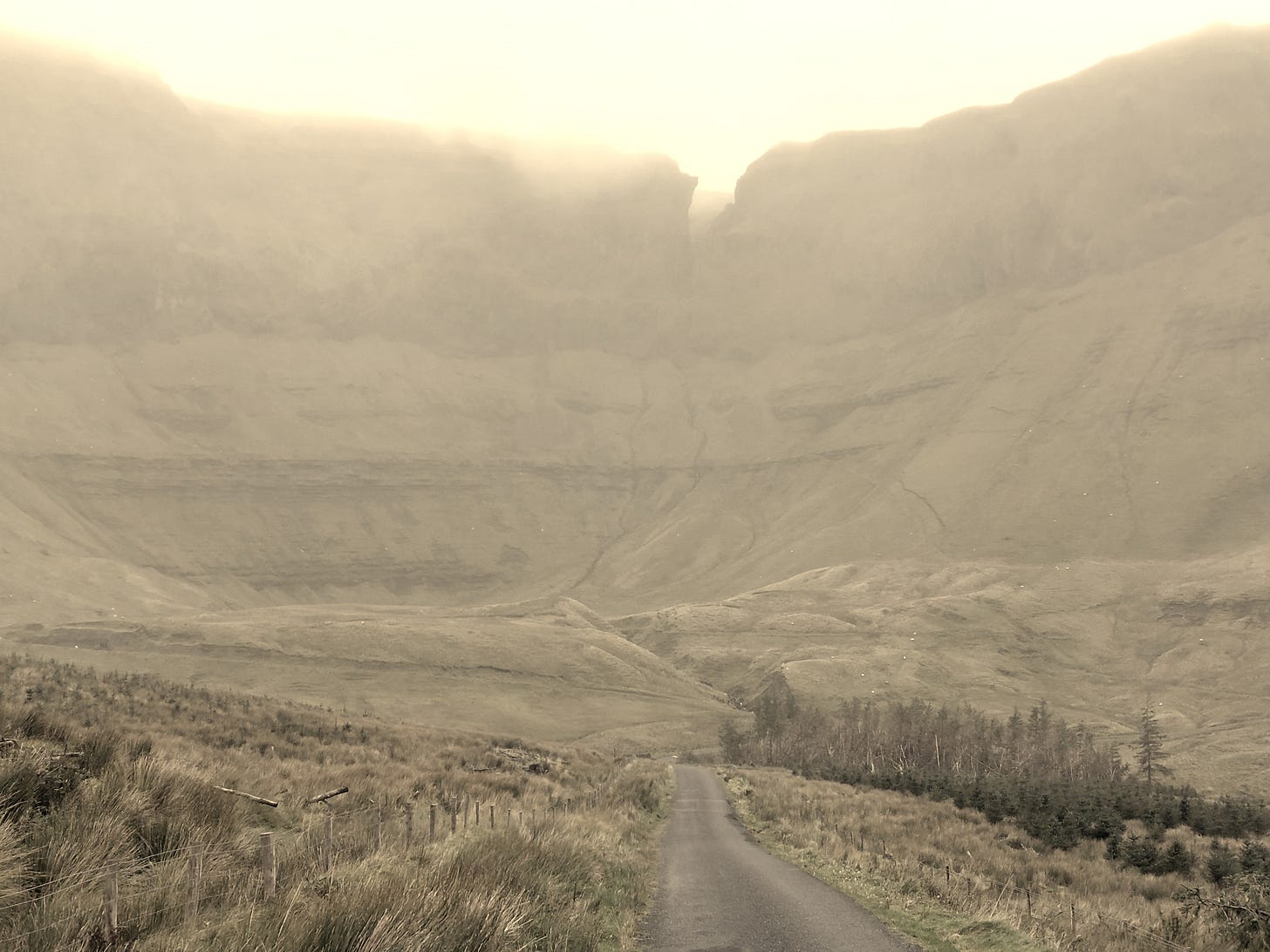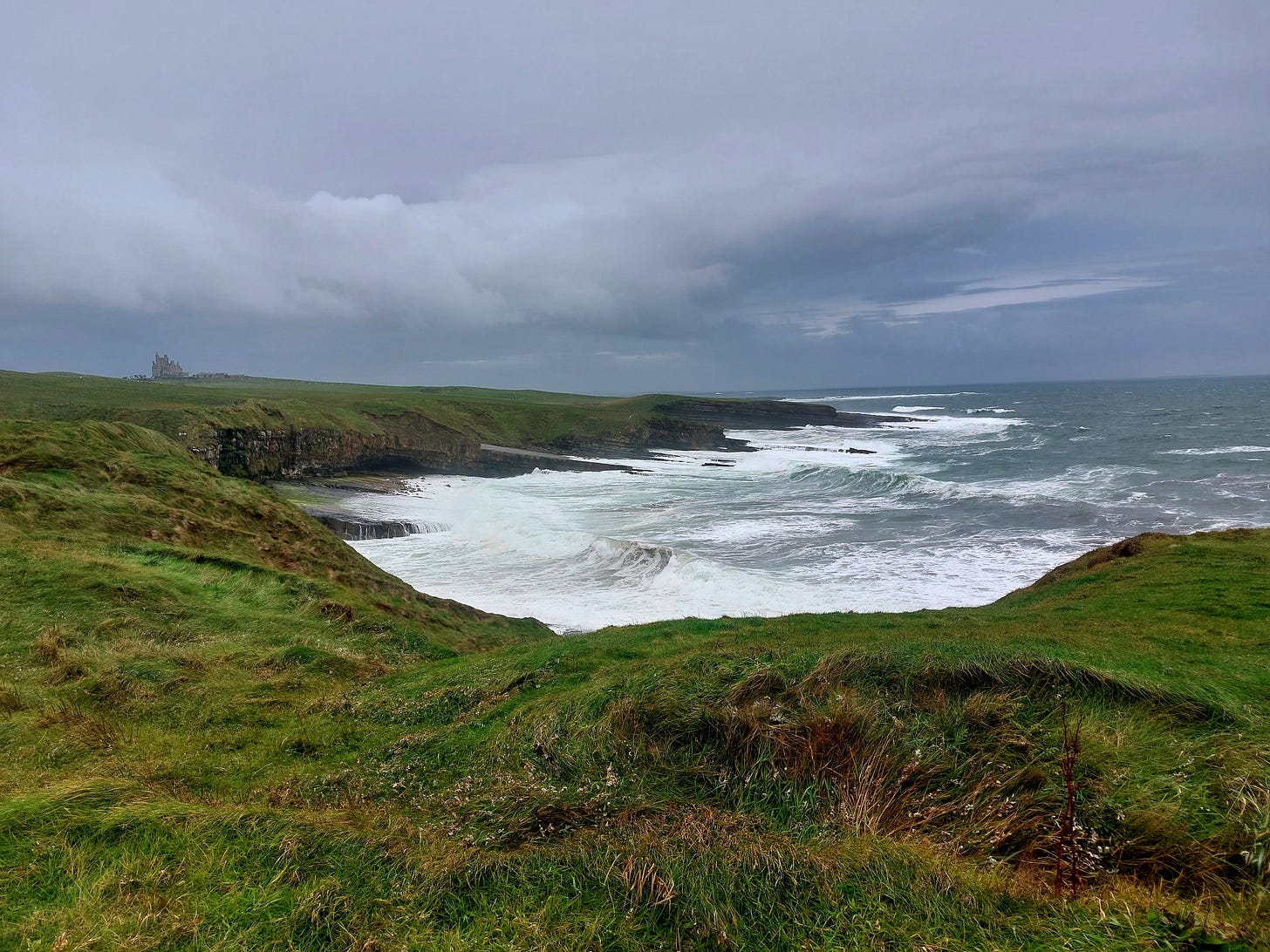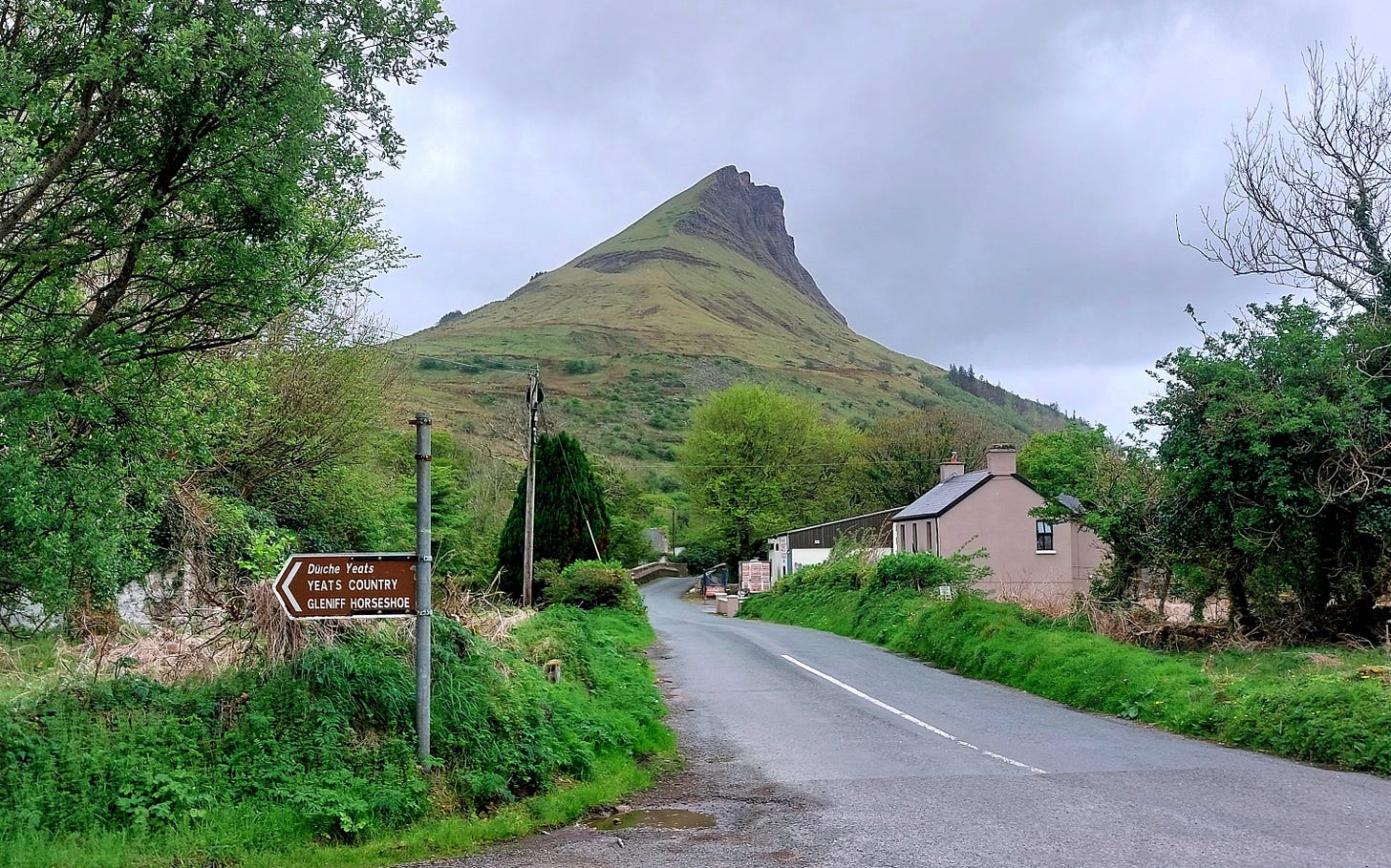What running can (and can’t) fix
Notes on marathon training as an expression of a midlife crisis
First, an apology: I have not been regularly posting to Dreamland. Reasons for this are manifold, but chief among them is that I have been spoiling my weeks with attritional weekend runs of 30 kilometres and more. Recovery from these efforts is difficult enough physically. Mentally, it has been impossible to channel my anger about, say, the disproportionate level of vacancy and dereliction in housing in the North West of Ireland, or the EPA’s dire warnings about the health of Ireland’s soil and waterways, into coherent pieces that bind together the various strands of our political economy and also includes a few good gags.
I’ve been touring the country roads of Sligo because I’m running the Dublin Marathon to raise funds for the UNICEF Gaza Appeal. I wish I could say something knowing and profound about these experiences, perhaps reveal some great epiphany about the illusion of man’s mastery over nature and the ephemerality of our species in the context of deep time, which I would insist had come to me while I meditated on the image of mountains and the sound of my labouring breath. Sadly, I have no epiphanies to report.
I don’t even really hear my breath. Only the voices of podcast hosts, their descriptions of dystopic events funnelled into my ears by wireless earbuds – US immigration agents are kidnapping autistic five-year-olds; the Trump administration is performing extrajudicial executions of alleged drug traffickers in boats off the coast of Venezuela; the AI boom is another dot com bubble threatening to bring down the global economy – all of which I consume passively while tipping along nicely in the forest in Hazelwood, around the bases of Benbulben and Knocknarea, the Horseshoe at Gleniff.
These hellish warnings about fascist power grabs are often delivered in earnest American accents and come sponsored by remote psychotherapy services, a line of medical marijuana products, an online mattress company, a home security system. There should be something reassuring about the unreality of cheery advertisements interrupting accounts of the fall of democratic institutions and the increasing victimisation of the world’s most vulnerable people – as though none need taking seriously because, in all likelihood, this is an insane and lucid dream.
Running has allowed me to explore the dream’s quieter corners, deeply rural places where isolated properties have gone to seed. I go about it slowly because I have no gears. Aged 40, the physical mechanisms governing tempo have not so much rusted as congealed. Indeed, to move beyond the tipping speed of five minutes per kilometre requires a set of painstaking logistical checks and re-checks tantamount to a SpaceX rocket launch – after which a rapid unscheduled disassembling is still more likely than not.
Speed was not always such a mythical island. I was once… well, not graceful, or beautiful, or even particularly fast, but I did have hair. I definitely used to be more attractive – in a way that was more obvious than the niche, subscription-only thing I’ve metamorphosed into. If only I’d known, way back, when I was drinking those pints and dying on those couches that I was draining my aquifers of life’s elixir, caving in the subterranean walls and limiting the well’s capacity to recharge. I might never now run a sub-20-minute 5k. Was the lads’ holiday to Ibiza in 2013 worth that sacrifice?
It’s obvious now that I am running, in part, to give an outlet to my midlife crisis – an organised bloodletting that helps accentuate the ‘life’ rather than ‘crisis’ aspects of turning 40. Ultimately, my children – aged two and four – have neither the time nor patience for crises of any kind, other than their own. Theirs pass, mercifully, like bad weather, the tumult characterised by brief fallings out and apologies and small arguments over whether or not I swore during the initial argument. I set an example. I admit nothing.
When my daughter was the age that my son is now, she was a fitful belligerent with no sense of empathy or right and wrong. She spent her days toddling about delightedly picking up and setting down things that pleased and displeased her, wanderings that came peppered with sudden revelations that she loved or hated me, my wife, her crayons, a cup, her dinner, my dinner, the TV remote, with an intensity so unbearable that it could only be expressed by screaming. Now, she spends multiple consecutive days in one unicorn dress and matching headband, unshakeably confident in her own sartorial choices and voicing pity for those without the wherewithal to follow her lead. She has always reminded me of myself.
My son, meanwhile, is a caring sort, apologetic whenever he’s trod on or stabbed me with some pointed implement. His need for craic is pathological. Any break in what should be, in his view, life’s infinite sequence of good times, is a criminal injustice. This includes any meal that’s not some mixture of sausages, beans, apples, and ice cream – a central European diet that he seems determined to follow despite our attempts to expose him to more Mediterranean delicacies, like pasta and sauce from Lidl.
I think about what their next stages will be.
And then I think about a night, in November 2023, when my wife came to me in tears. This, I stress, was very unusual. She is a very warm, thoughtful and loving person but famously unmoveable. She has cried twice in my company. Neither time was following the birth of our children. When I remind her of this, she replies: ‘Yeah. It wasn’t sad.’
She had seen an image on social media of a Palestinian child whose torso had been shorn from their body following an IDF rocket attack on a house in Gaza. In another video, IDF soldiers were pictured arresting a toddler in the West Bank. When we sat down to discuss this, I told her about a video I had seen of a Palestinian surgeon in Gaza, standing unsteadily outside a medical tent after having performed a series of amputations on his own daughter’s limbs without the aid of an anaesthetic. His daughter, the video’s caption read, did not survive the surgery.
There would be two more years of this imagery. Every day, more.
From my remove, ensconced in a comfortable house, insulated in a comfortable life, what could I do? Hug my kids tightly? They could only stand so much of that.
I wrote emails to politicians and different media. I attended Palestine Solidarity meetings in Sligo and wrote press releases to mark their marches. I started a Substack and posted lengthy pieces that displayed the requisite lyricism and moral clarity about condemning the arbitrary bombing of tent encampments by a modern military force funded and supplied by moralising Western powers, which I posted on Twitter to no engagement. Not even from the porn bots. And if the likes of Jenny_Li and Chloe and Atweetya – ardent supporters of my tweets about the lack of relegation in American sports – aren’t hitting like or follow, it’s perhaps worth looking again at reports of algorithmic suppression of dissent by the billionaire class of internet gentrifiers.
In response, I did what I’ve always done when I haven’t known what to do: go running. Why? I don’t know. If I thought about why I don’t know for long enough, I would probably get frustrated and go running. My mother had five children under the age of ten. She ran the Dublin marathon 20 times. Some energies can’t be exorcised in thought or expressed in language.
Reflecting on the year since signing up for the marathon, my mind’s eye fills with a carousel of images oscillating from the very beautiful, in my own life, to the obscene and horrifying, on my phone. While running, the podcasters ensured that reports of death tolls and massacres at aid sites kept coming as I kept going, looking at treetops, at lakes, at mountains, drenched in their microclimates, secure in this place, in this time. But the weight was there. A 5lb bag of sand in the heart. That’s Gaza.
Now, there is a ceasefire, and Palestinians must suffer the indignity of watching their killers cover each other in garlands while completing a public victory lap. This agreement is being marketed as a peace deal. In reality, it is a prisoner exchange. Peace deals don’t materialise all of a sudden, and especially not weeks after one side tried to assassinate the other’s negotiating team by bombing a sovereign third-party nation state. This ‘peace’ is an epiphany, a tired narrative device existing only in stories too hammy to reflect reality, which is that great change is glacial in pace, imperceptible, borne of repetition, crowning in character more than mind.
Is this that? No. What is it? I don’t know.
I’ll go running.
The Dublin Marathon is on October 26. Please donate to the UNICEF Gaza Appeal via my fundraising page here.





